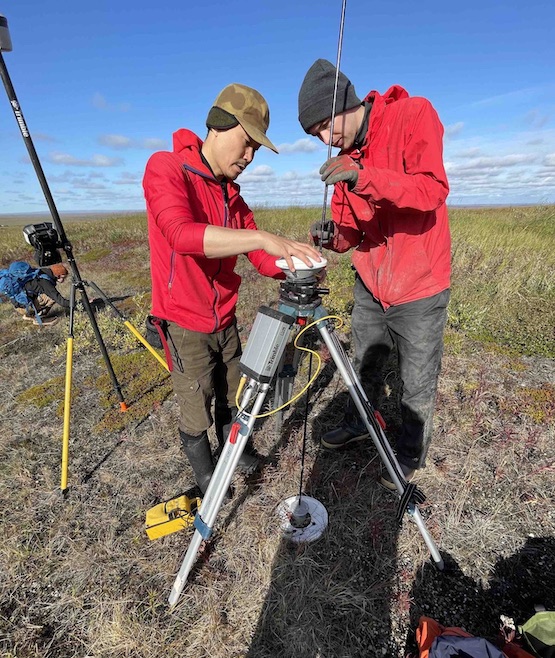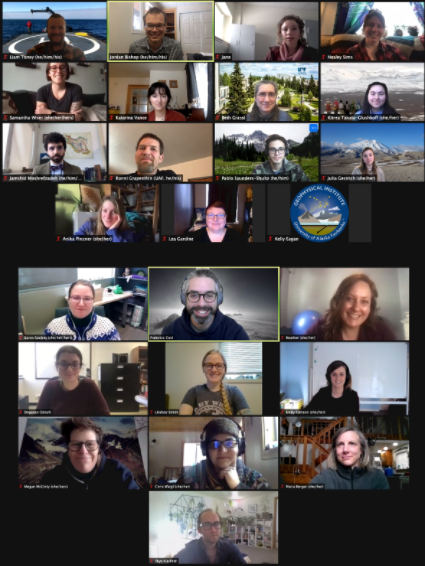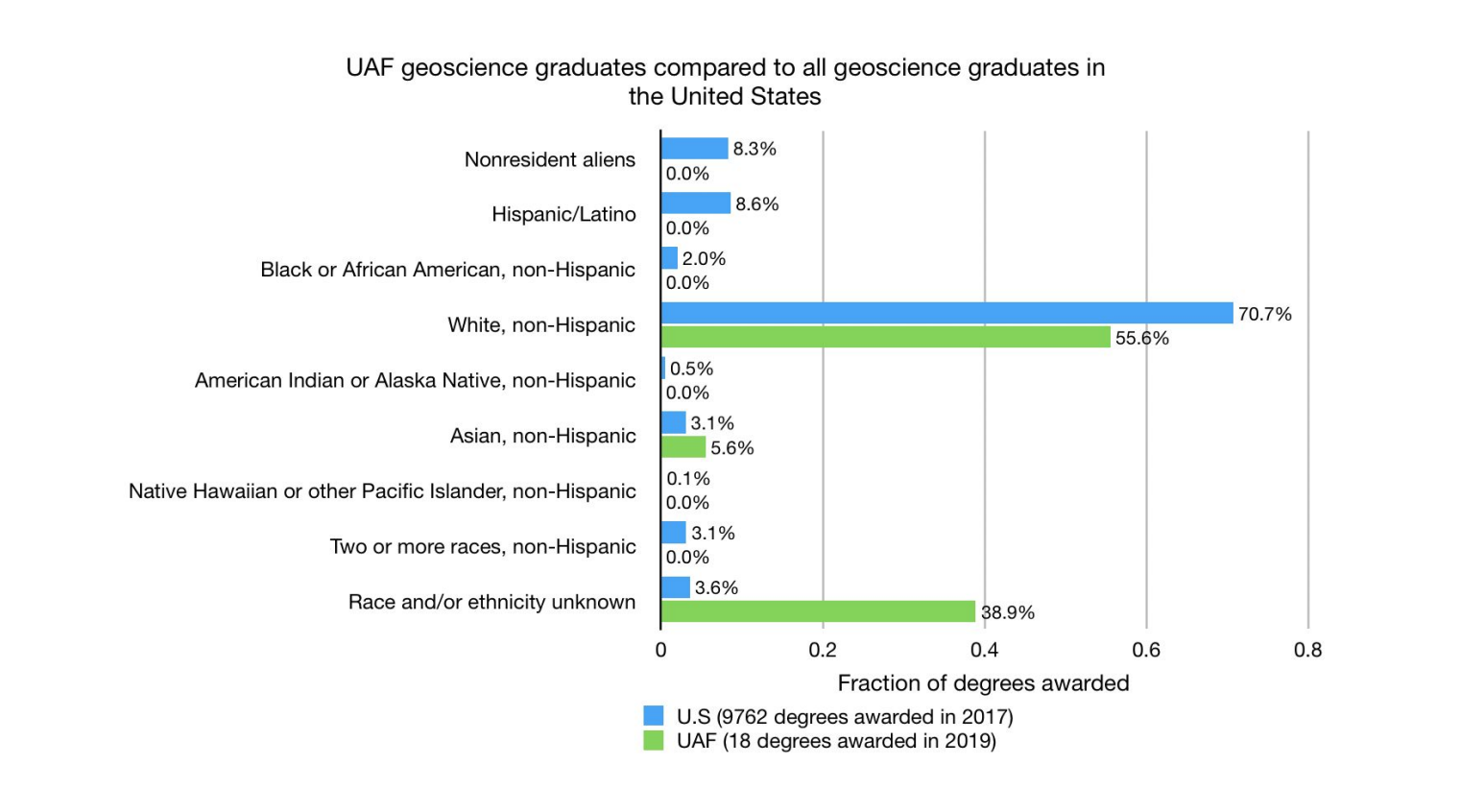
Ph.D. student in remote sensing.
The Geophysical Institute (GI) asserts that a diverse community brings about richer science, stronger cross-cultural connections, and more immediate societal benefits — but more fundamentally, building an inclusive community is the right thing to do. We realize that this effort requires a commitment to the principles of equity, inclusion, anti-racism and accountability to all of these. Please read below about GI and UAF efforts in these areas and see resources to learn more.
GI Diversity, Equity and Inclusion Committee
The GI Diversity, Equity and Inclusion (DEI) Committee is a collection of GI graduate students, staff and faculty who
are working to create a more diverse, equitable and inclusive GI community. The committee's goal is to help guide
and inform the GI on inclusivity actions and measures.
Contact the committee at uaf-gi-dei@alaska.edu for more information.
- Join the conversation in an open meeting
-
The GI DEI Committee is seeking feedback and participation from the entire GI. We hold semi-regular open meetings as the stochastic nature of research makes regular meetings difficult. Please contact the committee at uaf-gi-dei@alaska.edu for more information.
- Committee priorities
-
- Formalize a DEI evaluation component for GI hires
- Establish an accessible framework for DEI-related feedback within the GI
- Gather voluntary data (demographic, climate, etc.) to track GI-specific DEI trends
- Select current projects
-
- Create a GI-specific land acknowledgement template and guidelines
- Summarize UAF's Graduate Advisor Handbook into an accessible two-page document
- Maintain a GI Gear Lending Closet to provide short-term use for items that may be cost-prohibitive for those starting field work
- Work with GI Operations to update the GI's field safety rights document
- Current committee membership
-
- Vanesa Burgos Delgado
- Bryant Chow
- Victor Devaux-Chupin
- Kelly Eagan
- Claire Puleio
- Joshua Knicely
- Jessica Larsen
- Sara Wilbur
- Samantha Wiser
- Chynna Spitler
- Tianlang Zhao
- Tracy Durnan
Comment Box
The GI DEI committee would love to hear your questions, suggestions or other feedback. Use this form to submit your thoughts anonymously, or include your email if you would like a response. You may also email the committee directly at uaf-gi-dei@alaska.edu.
Please note: The GI DEI committee will read form responses and must report all relevant details of sexual misconduct to the Title IX coordinator or other school designee within 24 hours of becoming aware. See more options to report discrimination, sexual or gender-based misconduct, crimes, and other complaints here.
GI Inclusivity Resources
- The Geophysical Institute Graduate Student Association (GIGSA)
-
GIGSA advocates for students and organizes events and informal gatherings. It also maintains a New Student Guide with resources to support any new GI student.
- Accessibility at the GI
(Elvey Building, West Ridge Research Building, Akasofu Building, UAF campus in winter) -
Read more about ADA accommodations within UAF facilities.
- The Geophysical Institute (GI) is located on the West Ridge of Troth Yeddha', the University of Alaska Fairbanks. This map shows physical accessibility conditions across campus. Please note that some Elvey Building hallways require security card access and do not have automatic door access buttons, so they may be challenging for those with disabilities to enter.
- Winter accessibility: UAF grounds are usually covered in snow and ice from mid-September to the end of April. The UAF Disability Services office will contact Facilities Services for immediate barrier removal for those who need assistance.
- A shuttle bus service links areas of the UAF campus together. A general campus map with parking services is here. Contact UAF Disability Services with questions.
- Restrooms by gender inclusive / Americans with Disabilities Act (ADA) status: View a web map of bathrooms at UAF.
- The Geophysical Institute (GI) is located on the West Ridge of Troth Yeddha', the University of Alaska Fairbanks. This map shows physical accessibility conditions across campus. Please note that some Elvey Building hallways require security card access and do not have automatic door access buttons, so they may be challenging for those with disabilities to enter.
GI and UAF Geoscience Initiatives
Please find links to DEI initiatives and resources within the GI, the UAF geoscience department and University of Alaska at large below:
- UAF Geoscientists of Color
-
UAF Geoscientists of Color (GeoColor) is an informal community-building network for UAF scientists who are Black, Indigenous, and/or People of Color (BIPOC) across all academic/career levels. By fostering relationships between (geo)scientists of Color, we aim to support one another through the process of navigating (geo)science here at UAF. Although centered on geoscience, we welcome any UAF BIPOC science community members.
For further details, please contact Kitrea Takata-Glushkoff (pltakataglushkoff@alaska.edu).
For a list of resources for geoscientists who are BIPOC, click here.
- URGE: Unlearning Racism in the Geosciences
-
In spring 2021, a group of UAF students and employees led by Dr. Ronni Grapenthin participated in the NSF-funded Unlearning Racism in the Geosciences (URGE) project. The documents prepared by the UAF "pod" are available on the URGE website.

The UAF URGE Pod smiles for a photo during a group meeting on Zoom. - Traditional Ecological Knowledge (TEK) Talks
-
In 2020-2021, two graduate students, Margaret Rudolf (IARC) and Anika Pinzner (GI), organized the TEK Talks seminar series to increase scientists' respect for and understanding of indigenous cultures. Archives and resource lists are available.

Resources at UAF
There are a number of UAF-wide organizations and resources related to DEI. Click the drop-downs below to learn more.
- Inclusive Excellence at UAF
- Events & programs
- Nanook Diversity and Action Center
- IDEA Report
- Women and Marginalized Genders in Science and Engineering (W*iSE)
- Shine a Light Speaker Series
-
“Shine a Light: Promoting Conversation on Diversity, Equity, and Inclusion,” is a series offered by Northwest Campus, the Nanook Diversity and Action Center, and UAF's Department of Equity and Compliance. These sessions seek to encourage understanding, build empathy, and engage us all in thinking critically about our world views. Learn more about the series here.
Recruitment – Inclusivity Resources
- Post jobs where your applicant pool can find them
-
One way to build a diverse candidate pool is to look outside the conventional channels. See outreach and networking resources below to build more diverse applicant pools. These organizations maintain job boards or mailing lists for recruiting beyond the standard.
- Widening the applicant pool: PDF here
- Database – Where to Outreach for Diverse Applicants
- Consider a partnership with one or more of the organizations linked here
- Inclusive advertisements and questions [draft]
-
For UA hiring committees, HR maintains a folder of resources to help draft language for screening questions and job advertisements.
[UA INTERNAL LINK] - Outreach and network to build more diverse applicant pools
-
Need help outreaching and networking to build more diverse applicant pools? Consider a partnership with one or more of the organizations linked here.
- Diversity, Equity & Inclusion in UA Talent Acquisition
-
Find more information about diversity, equity and inclusion initiatives and programming at the campuses, or contact the Chief Diversity Officers at each campus.
Diversity, Equity & Inclusion | Talent Acquisition - UA HR Search Committee Resources
-
The UA HR Search Committee Resources folder [UA INTERNAL LINK] contains the following resources for the hiring process:
> Reference Check Considerations
> Search Committee Guidelines
> UA Sample screening questions
> Diversity sample screening questions
> Acceptable pre-employment inquiries under EEOC guidelines
> Search Committee Guidelines & Inclusion and Diversity in UA Recruitment Processes (video)
> Inclusive Language Guide
> Search Committee & Implicit Bias Training (video)
> Implicit Bias in Hiring
> Implicit Bias Training (video)
For more resources on implicit bias follow this link.
Reporting
The Office of Rights, Compliance and Accountability (formerly the Title IX Office) leads UAF’s efforts to create a more diverse, equitable, accessible, and inclusive community.
File a report with ORCA here.
Frequently Asked Questions
- Is there a policy on bathroom use and/or gender neutral bathrooms, as well as respect of trans* identities?
-
Yes! It is UAF policy to respect people's pronouns and choice of bathroom (PDF brochure) as it fits our gender identities. There is an interactive map of gender-inclusive and ADA compliant accessible bathrooms.
- What does diversity look like at UAF and the UAF GI?
-
UAF is a federally designated Alaska Native Serving Institution, embedded in the Fairbanks community, which is made up of 65% White, 10% Black American, 10% Native American or Alaska Native, 9% Hispanic or Latino, about 5% Asian, and 0.8% Pacific Islanders (US Census). The UAF community reflects this composition. Specifically, the student body served by UAF is made up of approximately 20% Native American/Alaska Native students. You can learn more about specific numbers at UAF via the IDEA report which gives a more thorough description and breakdown of UAF demographics as of 2018-2019.
- What are UAF and the GI doing to address diversity?
-
UAF has expressed its commitment to building an environment in which diverse faculty, staff and students can thrive in its mission and strategic plan. The GI has formed a DEI committee, this website, and initiatives like the TEK Talks seminar series. The URGE pod at UAF has evolved into a formal course, GEOS F4/692 Social Justice Topics in Geoscience.
- What does this look like in the geosciences field?
-
The geosciences community has become more visibly aware of both its history and the gap between full representation of the wider community and reality. It knows much is to be done and there are no easy fixes. At UAF in 2021 a group of geoscience students and faculty have been involved in the Unlearning Racism in the Geosciences (URGE) project and, as one of the URGE deliverables, assembled the below visualization:

